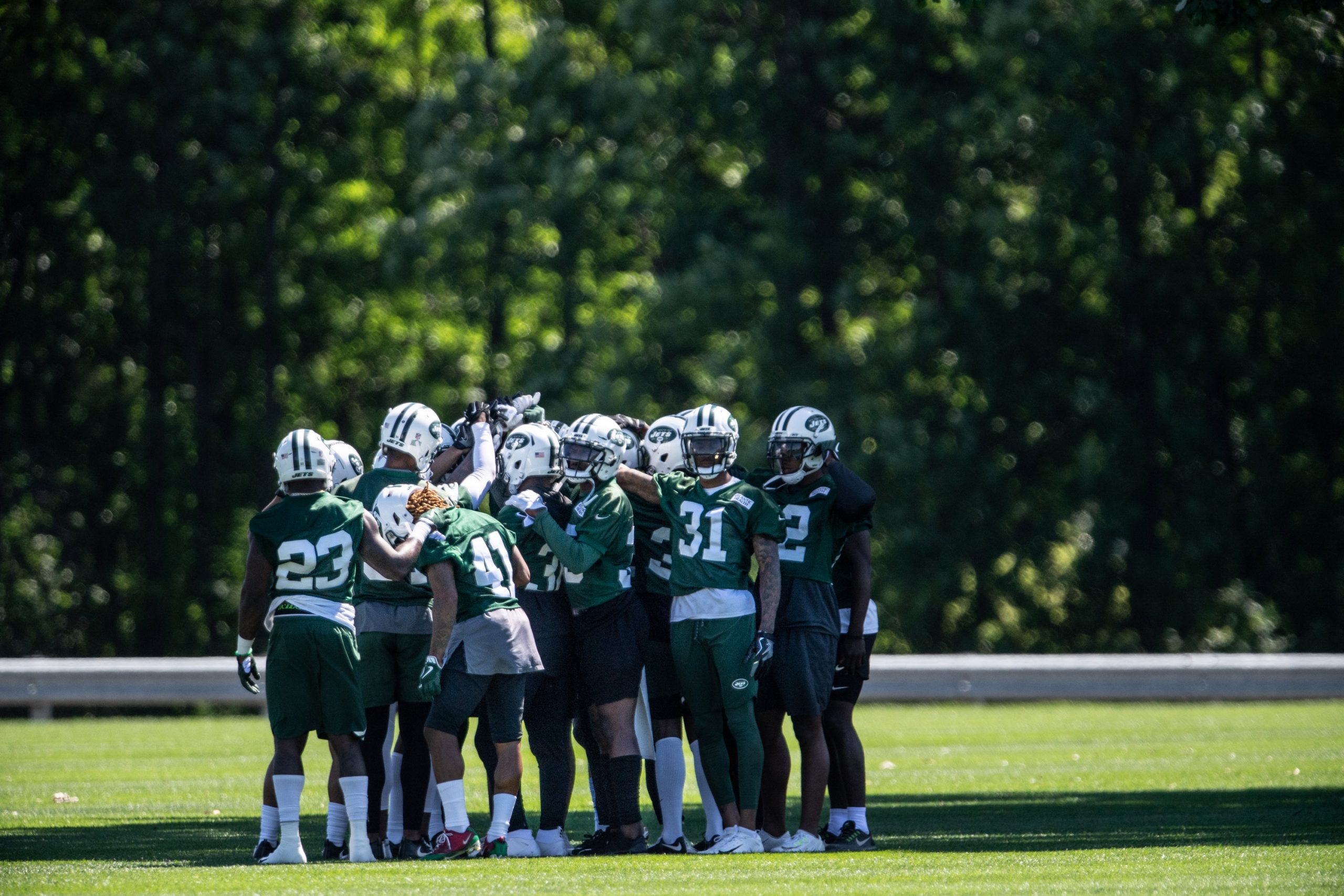How the Pandemic Could Change the NFL Offseason – Forever
Why this matters
In 2020, COVID-19 meant a virtual offseason with no in-person or on-field work. Players were healthier. Quality of play remained high. Now, NFL Players Association president JC Tretter and others want to make those changes permanent.
DeMaurice Smith, the executive director of the National Football League Players Association currently tasked with negotiating how the NFL offseason should look, understands that a large part of the league’s ongoing narrative is driven by the salary cap.
But Smith has another “cap” he likes to talk about. It’s the “amnesia cap,” the one that enables many to forget what the past year was like in the country and in the NFL.
While the league was able to play a full schedule during the 2020 season, doing so during the coronavirus pandemic was difficult and required sacrifice.
So now, as the NFLPA and NFL are negotiating the terms of the offseason programs that began April 19 and run through June, Smith wants everyone to remember.
In 2020, mitigating COVID-19 meant a virtual offseason with no in-person or on-field offseason work, a shortened training camp with a two-week acclimation period, fewer players in camp, and no preseason games.
The result of those changes? There were 30 percent fewer head injuries, a 23 percent decrease in missed playing time related to injuries, and a 45 percent decrease in heat-related illness.
Those numbers have led Smith and the union to question the necessity of the NFL’s traditional offseason schedule and workload, both this year and in the future.
Last month, NFLPA president and Cleveland Browns center J.C. Tretter issued a statement on the union’s website calling for the permanent elimination of organized team activities (OTAs) and minicamps.
“The good news for our sport is that while the NFL season looked and felt noticeably different from previous years, we learned that the game of football did not suffer at the expense of protecting its players more than ever before,” Tretter wrote. “Our process is to follow the science on what is safest for our guys, and many of the changes this past year – like no in-person offseason workouts/practices, the extended acclimation period before training camp and no preseason games – gave us a year of data that demonstrates maintaining some of these changes long-term is in the best interest of the game.”
COVID-19 concerns
The league and union currently disagree over what the 2021 offseason should look like.
In a recent memo, the NFL told teams that offseason programs will last nine weeks, with virtual team meetings running through mid-May, on-field work beginning shortly thereafter, and 10 days of OTAs and a mandatory minicamp taking place between late May and mid-June.
Meanwhile, the NFLPA has advised players to not attend voluntary in-person workouts this offseason, and players from 19 teams have already announced that they will be skipping those workouts.
The NFLPA’s guidance is driven first and foremost by ongoing concerns about the pandemic, with Smith stating on Twitter that players should “continue to use an abundance of caution given the current environment.”
The NFL reportedly is confident in the coronavirus protocols it developed last season and believes that it is safer for players to work out in team facilities than elsewhere. The league also has instructed teams to attempt to have vaccines available for players, staff members, and their families during the initial phase of the offseason programs.
However, NFLPA medical director Thom Mayer pointed out during a Zoom call with reporters this week that the nation is still struggling to contain the virus, noting that there are more than double the cases now—about 70,000 per day—than there were in March 2020.
“This is not the time to take our foot off the accelerator,” Mayer said. “I know we’re all tired and want it to be over. But, it’s not over.”
Smith makes a similar argument, pointing out that despite the league’s protocols, positive COVID-19 tests forced the Browns to compete in a playoff game without head coach Kevin Stefanski and several other coaches.
From August 1, 2020, through February 6, 2021, the day before Super Bowl LV, the league administered 959,860 COVID-19 tests, with 262 players and 464 staff members testing positive.
“J.C. [Tretter] was breaking down blocking schemes on the sideline because he didn't have a coach,” Smith says. “I mean, this actually happened, right? So I think that we need to every now and then take off the amnesia cap and actually remember what things were like.”
Said Tretter: “Right now, we are not normal. The NFL doesn’t get to decide when the pandemic is over or when we get to stop caring about COVID. COVID is still out there. Our players do not want to catch it still. There are plenty of guys who have talked about issues that they felt for a long time after catching COVID, (Browns defensive end) Myles (Garrett) being one of them. He talked about it all year, about how he felt that it was still bothering him.
“So, guys don’t want to catch something and make themselves vulnerable to that in the middle of unnecessary practices in the springtime that could impact them during games in the fall.”
'You need the data'
COVID-19 isn’t the only reason Tretter and others want to do away with the bulk of the NFL’s offseason work. Last month, he said that he felt “the best I’ve felt in probably five years at the end of the season. I feel healthier. Mentally, physically, I feel better.
“I know anecdotally, a lot of players agree with that, but … anecdotes don’t tell the whole story. You need the data.”
Conventional football wisdom long has held that the NFL’s offseason work regimen is necessary to prepare players physically and mentally for the rigors of Sunday games. In his letter on the NFLPA’s website, Tretter pushed back against that belief by citing league-wide injury data for the 2020 season.
In addition to suffering fewer concussions, heat illnesses, and missed games and practices due to injuries, players experienced lower body strains and knee ligament tears at rates that were within five-year averages – easing fears, he wrote, that because players didn’t have the regular access to gyms and training facilities they’d normally use to prepare for training camp, they would be at a higher risk of those injuries.
Tretter also wrote that the league was still able to “put out a top-notch product for our fans” without as much offseason work. Compared to 2019, missed tackles and penalties were down, while average points scored per game (49.6) were the highest they have been since 1970.
In addition, Tretter noted, the NFL enjoyed a high level of drama, competitiveness, and parity: 69.9 percent of games were within one score during the fourth quarter, the second-most in league history, while 18 teams were in playoff contention the final week of the season, the most since 2006.
“We’ve had this false reality that a ton of reps are necessary (even) as we watch our bodies break down by the end of the year, every year,” Tretter said during Super Bowl week. “And we just get right back into the offseason and grind our bodies down to jump right back into training camp.
“It’s a never-ending grind. We saw that we can do things differently. And the level of play didn’t go down. We still had maybe one of the most exciting seasons of all time heading into an amazing playoffs.”
'The veterans love that s—t'
Tampa Bay Buccaneers head coach Bruce Arians recently expressed skepticism about the decision of so many players to not participate in voluntary on-field work, suggesting that veterans such as Tretter wanted to cut back on practices so that younger players wouldn’t have as much of an opportunity to take their jobs.
“If we lose spring, (young players) are not getting developed,” Arians said. “The veterans love that s–t, because that means they don’t get to take their jobs. So when you have the veterans voting on the rules … these young kids need practice. If the vets don’t want to come, they don’t have to come. It’s still voluntary. We need the preseason; we definitely need some preseason games.”
Tretter refuted Arians’ claim. “We polled our players of all ages,” he said. “And the vast majority of all players came back and said what they thought was best for this year. And that was a virtual offseason. That was the same if you were in your 10th year or you were in your first year. The data was consistent across all years. It wasn’t the old guys saying it should be virtual and the young guys saying please let us go back in person.
“The same percentages across the board were saying the same things. I don’t see how people look at this as one group in the union going after another group. I see it completely different. I see it as everybody standing together just as we did last year when we wanted safety measures and the league wasn’t giving it to us and you saw a bunch of old guys and star players come out and say, ‘I want these protections for me. I want these protections for guys who can’t say it themselves.’”
Tretter also chuckled at the notion that any NFL coach would award jobs based on what happens in OTAs and minicamps.
“I’m not sure how much carryover there is from what you look like in shorts in April versus what you look like in pads in (August) and September,” he said.
Not all players want to dramatically reduce offseason work. In February, Kansas City Chiefs tight end Travis Kelce – who set a single-season receiving record for tight ends in 2020 – said that he didn’t think it would be “very beneficial to the league in general” to eliminate OTAs, minicamps, preseason games, and other opportunities for “young guys to get film and get those reps.”
“Well, me personally, I’ve always been a guy where I need the reps,” Kelce said. “I’m out there every day at practice, working my tail off. I need all the reps that I can get so I can be ready for every single look out there on the field. And that includes training camp, that includes OTAs and minicamp. So I’m a big advocate for making sure guys get those reps.”
Cutting back on offseason work isn’t a new concept. In 2011, the league and union agreed to reduce OTAs and eliminate two-a-day practices during training camp to reduce the risk of brain injury. And over the past decade, leagues, teams, and coaches at every level of the sport have been adjusting in order to limit hitting outside of games to protect players’ health.
Former NFL head coach Jim Mora Jr. believes that players will continue to push for reductions, especially with the league adding a 17th game to the regular-season schedule.
“Look, it’s a different world today. These players are gaining a little bit more power,” he said. “They’re asserting themselves more, but I know this: They’re going to be ready to go when the season starts. And if they feel fresh, and they feel revived, that’s a good thing. If they feel worn out because they were forced to come into a facility, if you don’t want to go today, (if you don’t have the attitude of) ‘I can’t wait to be here, it’s so exciting to be here,’ I don’t know if it’s a good thing.
“These guys know their bodies. They take care of their bodies. This is how they earn their living; it’s their profession. I think the restrictions of having to come in in the offseason and do certain things can take a toll on these guys. We don’t understand how brutal a sport this is, and how it’s not just physically draining, it’s emotionally draining, and they need a chance to recover.”
Monthly Issue
Now & Then: How Sport Has Transformed
For many, it’s been approximately a year in the life of a pandemic. We’ve seen tragedy, resilience, growing gaps of opportunity and opportunities for growth, juxtaposed in communities across the globe. The world of sport was not immune.
From a pause in play, to a push for more progressive racial justice, to unanswered questions about the long-lasting impacts of COVID-19 that still linger in the air - what do we wish we knew then, that we know now?




